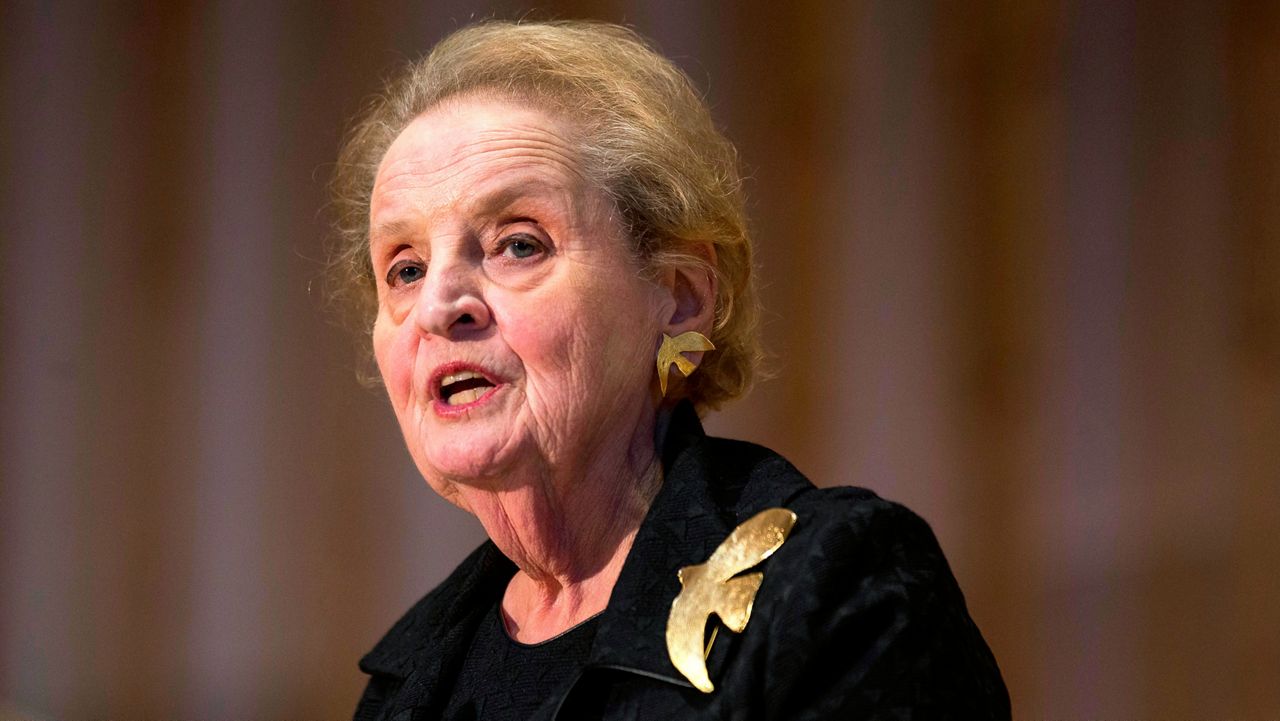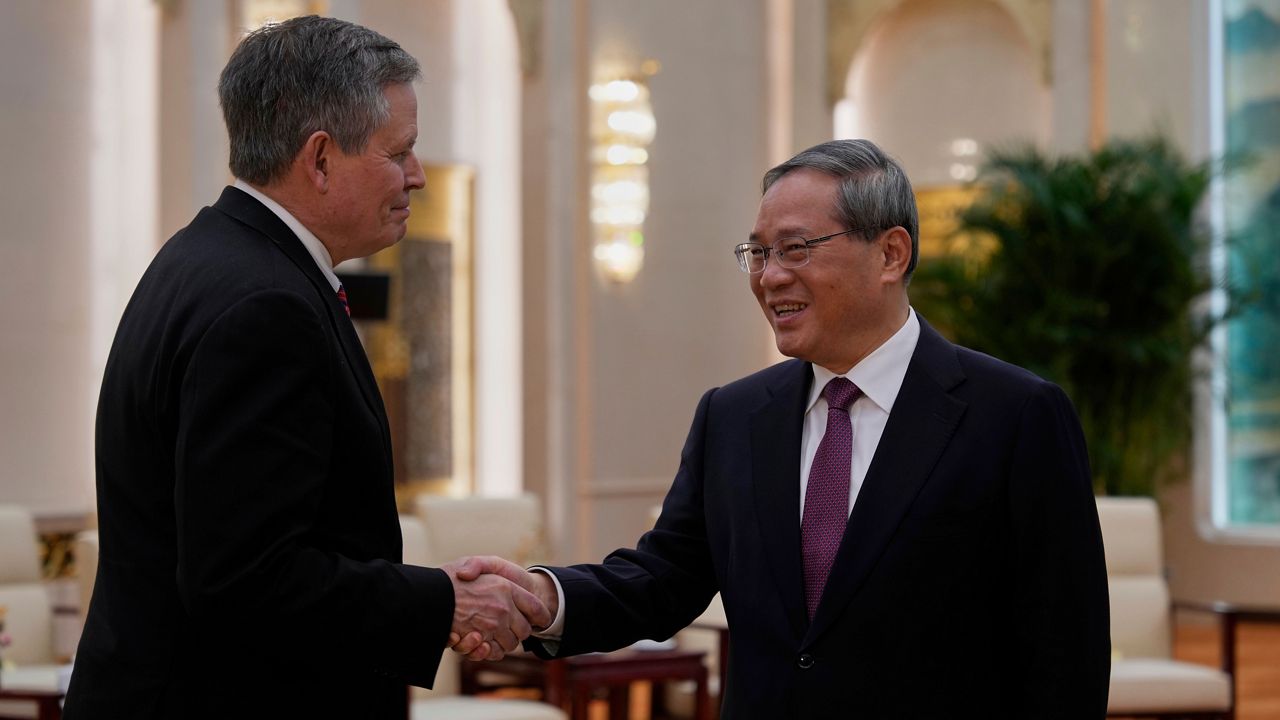Former Secretary of State Madeleine Albright, the first woman to serve in the role, has died after a battle with cancer, her family announced. She was 84.
"She was surrounded by family and friends," the statement reads. "We have lost a loving mother, grandmother, sister, aunt and friend."
Albright came to the United States in 1948 from Prague as a refugee, her family said, noting that she "rose to the heights of American policy-making," including receiving the Presidential Medal of Freedom in 2012 from then-President Barack Obama. Albright ultimately became a U.S. citizen in 1957.
Albright graduated from Wellesley College in 1959 and eventually earned a doctorate from Columbia University in 1975, at one point studying under legendary diplomat Zbigniew Brzezinski in a post-graduate course.
She took a position working for Maine Sen. Ed Muskie before Brzezinski recruited her to work for him on the National Security Council. Her work with Brzezinski, she said, "did more to shape my understanding of international relations than anyone apart from my father, and I was grateful when I served in government to be able to call upon him for advice and counsel."
"Many knew Dr. Zbigniew Brzezinski as a brilliant strategist," Albright wrote on Twitter in 2017 after Brzezinski's passing. "I knew him as my professor, mentor, and dear friend."
After her tenure on the National Security Council, Albright taught at Georgetown University and served as an adviser to Democratic candidates on foreign policy until Bill Clinton's victory in 1992, when she was appointed to serve as Ambassador to the United Nations.
In Clinton's second term, after a 99-0 Senate confirmation vote, Albright became Secretary of State, the first woman to take on the role. She became the face of U.S. foreign policy, pushing for the expansion of NATO and championing democracy worldwide.
In a statement Wednesday, Clinton called her an "extraordinary human being" and "one of the finest Secretaries of State."
Albright played a leading role in pressing for the Clinton administration to get militarily involved in the conflict in Kosovo. She also toed a hard line on Cuba, famously saying at the United Nations that the Cuban shootdown of a civilian plane was not “cojones” but rather “cowardice.”
As America’s top diplomat, Albright made limited progress at first in trying to expand the 1993 Oslo Accords that established the principle of self-rule for the Palestinians on the West Bank and in Gaza. But in 1998, she played a leading role in formulating the Wye Accords that turned over control of about 40% of the West Bank to the Palestinians.
Albright also spearheaded an ill-fated effort to negotiate a 2000 peace deal between Israel and Syria under Syria’s late President Hafez al-Assad, and helped guide U.S. foreign policy during conflicts in the Balkans and the Hutu-Tutsi genocide in Rwanda.
In a statement, President Joe Biden called Albright a "force for goodness, grace, and decency — and for freedom."
"Madeleine Albright was a force," he wrote. "Hers were the hands that turned the tide of history."
"She was an immigrant fleeing persecution," the president wrote. "A refugee in need of safe haven. And like so many before her — and after — she was proudly American."
"Working with Secretary Albright during the 1990s was among the highlights of my career in the United States Senate during my tenure on the Foreign Relations Committee," Biden recalled. "As the world redefined itself in the wake of the Cold War, we were partners and friends working to welcome newly liberated democracies into NATO and confront the horrors of genocide in the Balkans."
"When I think of Madeleine, I will always remember her fervent faith that 'America is the indispensable nation,'" Biden said. "Jill and I will miss her dearly and send our love and prayers to her daughters, Alice, Anne and Katie, her sister Kathy, her brother John, her six grandchildren, and her nephews and grandniece."
Albright remained outspoken after her time in the White House, criticizing Clinton's successor, President George W. Bush, for using “the shock of force” rather than alliances to foster diplomacy, claiming Bush had driven away moderate Arab leaders and created potential for a dangerous rift with European allies.
When the Senate Foreign Relations Committee asked her in January 2007 whether she approved of Bush’s proposed “surge” in U.S. troops in bloodied Iraq, she responded: “I think we need a surge in diplomacy. We are viewed in the Middle East as a colonial power and our motives are suspect.”
She even weighed in on Russia's invasion of Ukraine, writing in a recent New York Times op-ed that Russian President Vladimir Putin is making "a historic error."
"Instead of paving Russia’s path to greatness, invading Ukraine would ensure Mr. Putin’s infamy by leaving his country diplomatically isolated, economically crippled and strategically vulnerable in the face of a stronger, more united Western alliance," she wrote.
"The impact that Secretary Albright ... had on this building is felt every single day in just about every single corridor," State Department spokesperson Ned Price said at a briefing shortly after the news broke of her death.
"A tireless champion of democracy and human rights, she was at the time of her death a professor at Georgetown University's School of Foreign Service, chair of Albright Stonebridge Group, part of Dentons Global Advisors, chair of Albright Capital Management, president of the Harry S. Truman Scholarship Foundation, chair of the National Democratic Institute, chair of the U.S. Defense Policy Board, and an author," her family wrote in a statement.
Tributes to Albright poured in from across the political spectrum and diplomatic world, as well as some major notable figures outside of politics.
"As the first woman to serve as America’s top diplomat, Madeleine Albright was a champion for democratic values," former President Barack Obama wrote on Twitter. "Michelle and I send our thoughts to the Albright family and everyone who knew and served with a truly remarkable woman."
"Today, our nation and the world lost a towering champion for peace, diplomacy and democracy," House Speaker Nancy Pelosi, D-Calif., said of Albright. "Her historic tenure as our nation’s first woman to serve as our top diplomat paved the way for generations of women to serve at the highest levels of our government and represent America abroad."
"Secretary Albright’s remarkable, pathbreaking life took her from fleeing Soviet communism as a young girl with her family to helping steer American global leadership from the commanding heights of public service half a century later," Senate Minority Leader Mitch McConnell, R-Ky., wrote in a statement. “You didn’t have to share every one of Secretary Albright’s policy views to appreciate her dedicated leadership on behalf of our nation."
Hawaii Sen. Brian Schatz, who is related to Albright via his brother's marriage, paid tribute to the woman he called "Grandma Maddie."
"Madeleine Albright is a towering figure in American and world history, but I knew her as family," Schatz wrote on Twitter. "She is my oldest brother’s mother in law, and when I came to Washington, we became friends. Actual friends. She was thrilled to have a politician in the family, and wanted to help."
"She was a tireless and sharp political strategist, the kind of person who would watch CSPAN for fun, who was endlessly fascinated by politics at all levels, from municipal elections to the United Nations," he continued. "I remember all of our long talks about everything, but mostly about our two shared loves, family and politics over a meal, which she would let me pay for occasionally."
"But most of all I will remember Grandma Maddie, who was kind and curious with my kids, taking us out to dinner in Georgetown, and being one of the most giving, decent human beings that I have ever known," he concluded. "May her memory be a blessing."
"Madeleine Albright was a lion," Connecticut Sen. Chris Murphy wrote on Twitter. "She understood both the miracle and fragility of democracy and dedicated her career to fighting for its survival. She was a trailblazer who mentored thousands - including me. The country will miss her. The world will miss her. I will miss her."
"Saddened to hear the news of Madeleine Albright’s death," NATO Secretary-General Jens Stoltenberg wrote on Twitter. "She was a force for freedom, an outspoken champion of NATO, an inspirational colleague and friend. My deepest condolences to her family & the American people."
"It is impossible to fully capture Madeleine Albright's influence and impact on the world," Minnesota Sen. Amy Klobuchar wrote. "It is because of courageous women like her that we’ve made so much progress, and so much more is possible. This loss is immeasurable. John and I are keeping her family in our prayers."
"The great Madeleine Albright was a trailblazer for women and staunch advocate for global diplomacy," Energy Secretary Jennifer Granholm wrote. "May she rest in peace, and may her family find solace in knowing that her legacy has inspired many—including me."
"From refugee to the first female U.S. Secretary of State, Dr. Madeleine Albright was a trailblazer," Illinois Rep. Adam Kinzinger wrote on Twitter. "She was one of the brightest minds we’ve ever had, a champion for human rights. In mourning her passing, may her incredible legacy continue to inspire us and future generations."
"Madeleine Albright came to America as a refugee and broke barriers as the first woman to serve as U.S. Secretary of State," wrote Massachusetts Sen. Elizabeth Warren. "She was a powerful champion for human rights and democracy, and she inspired generations of future leaders. My heartfelt condolences to her loved ones."
"Secretary Madeleine Albright was a good friend of mine for the last 28 years," iconic musician and actress Barbra Streisand wrote on Twitter. "I am so sad about losing a good friend and a great woman in this fragile world of ours. May you rest in peace dear one."
"I’ve had the honor of spending time with her over the years," tennis legend Billie Jean King wrote of Albright. "She possessed a brilliant mind & a trailblazing spirit. My deepest sympathies go out to her loved ones."
"Madeleine Albright was one-of-a kind and first-of-a-kind. As a refugee who fled the Nazis and Soviet Communism, she embodied the American dream with her inspiring life story and long and distinguished career leading America’s foreign policy, eventually rising to become our country’s first female Secretary of State," Senate Majority Leader Chuck Schumer wrote in a statement. "While she may have been small in stature, she was a titan in American history and statecraft."
"Her brilliance, passionate patriotism, and sharp wit made her a formidable presence on the world stage and her story inspired women and girls across the globe," Schumer continued. "My thoughts are with Secretary Albright’s family as our nation pays deep gratitude for her years of service and remembers her life and legacy."
The Associated Press contributed to this report.








